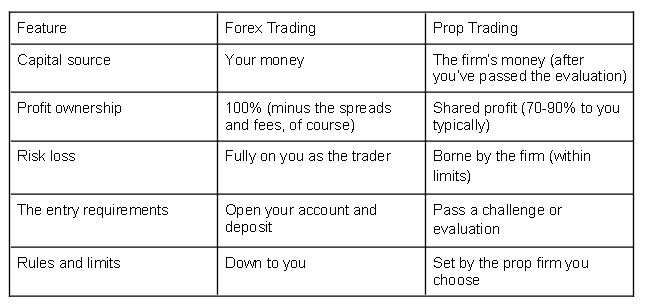How Does Prop Trading Differ from Retail Forex Trading?
(2).jpg)
The forex market is one of the most active and accessible financial markets in the world, and there are two main ways to get involved: retail forex trading and prop (proprietary) trading.
At a glance, both involve trading currency pairs with the goal of making a profit. But the structure, funding, and pressure around each one are very different. Whether you’re just starting out or thinking about taking your trading to the next level, it’s important to understand the key differences.
Here’s a simple breakdown of how prop trading and retail forex trading compare, and what it means for your strategy, risk, and potential growth.
What Is Retail Forex Trading?
Retail forex trading is when you open your own trading account, deposit your own funds, and trade independently, usually through an online broker. You’re in complete control of your capital and decisions.
Key points:
- You trade with your own money
- You keep 100% of profits (and losses)
- You can use leverage, but it’s often limited in some regions
- There are no external rules, aside from your broker’s terms
- Most traders use demo accounts first, then move to live accounts with small deposits
Retail trading is flexible and beginner-friendly, but the downside is that you carry all the risk. Many retail traders lose money early on, especially when over-leveraging or trading emotionally. Learning risk management and building discipline are essential.
What Is Prop Trading?
Prop trading (short for proprietary trading) is when a trader uses a firm's capital rather than their own. In return, the firm takes a share of the profits, usually through a split. But if you lose, it’s the firm’s money at risk, not yours (after passing certain evaluations).
You typically prove your skill through a challenge or evaluation phase. If you meet the firm's rules, such as hitting a profit target without breaking drawdown limits, you're given a funded account.
Key differences:
- You don’t use your own money after passing the challenge
- You trade with larger capital (often £10,000–£100,000+)
- You split profits (e.g. 80/20 or 70/30, depending on the firm)
- There are rules and risk parameters you must follow
- Some firms offer coaching, feedback, or tools to help you grow
Working with the best prop trading firm can give you a clear structure, larger earning potential, and extra support, but you have to be disciplined, consistent, and ready to follow strict risk controls.
Main Differences Between the Two

Which One Is Right for You?
That depends on your trading style, risk appetite, and goals...
Retail forex trading gives you full freedom, but it also comes with full exposure, as you’ll need to manage every part of your performance and mindset, especially during losing streaks.
Prop trading can give you access to much larger capital, but you’ll need to follow someone else’s rules and maintain consistent results. If you’re already trading profitably with good risk management, it can be a way to scale up without risking your savings.
Both paths require discipline, patience, and a willingness to learn from mistakes. Neither one is a shortcut to riches, but both can be part of a serious trading journey.
Our Roundup
Prop trading and retail forex trading both offer exciting opportunities, but they suit different types of traders. If you're just starting out, retail trading may help you build experience. If you're ready to scale with structure and support, prop trading might be the next step.
Whichever route you take, focus on your skills, mindset, and risk control first because, in both cases, consistent trading is what leads to long-term success.


